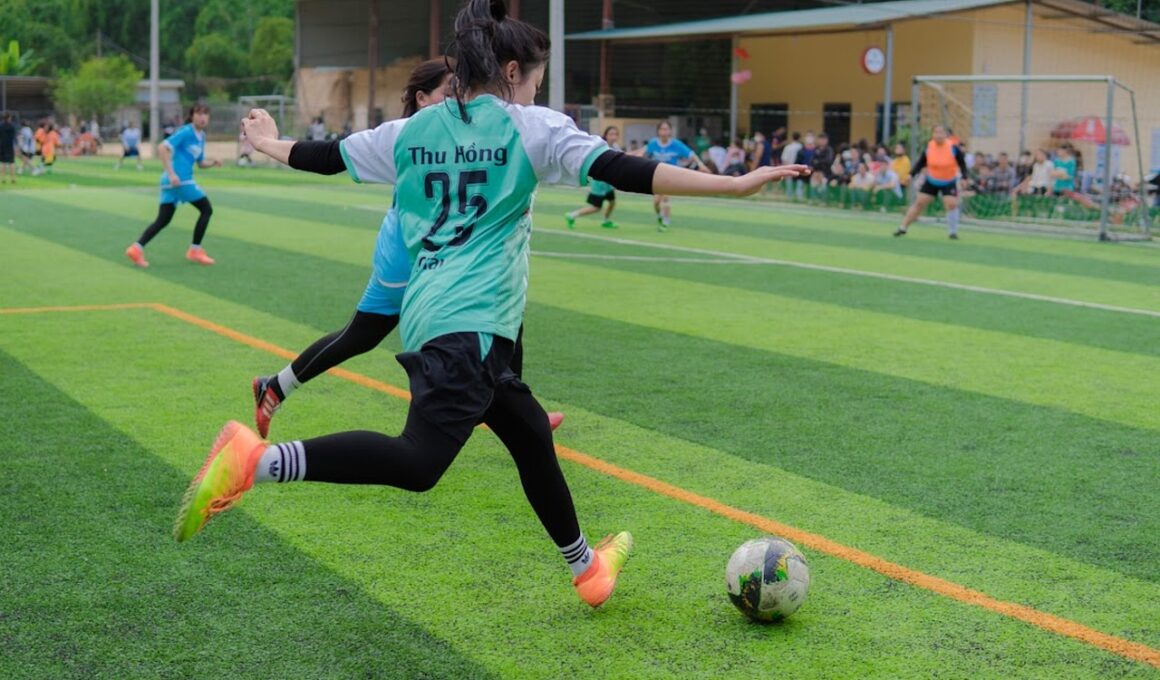Optimizing Football Performance with Cross-Training Methods
Developing enhanced football performance requires a multifaceted approach, incorporating various training techniques and methodologies. Cross-training methods stand out due to their ability to diversify an athlete’s physical capabilities. By engaging in activities outside of traditional football drills, athletes can build strength, stamina, agility, and flexibility. These diverse exercises help prevent injuries by addressing muscle imbalances and promoting overall athletic development. Athletes can explore sports such as swimming, cycling, or even yoga to supplement their football training. Swimming improves cardiovascular endurance and assists in recovering sore muscles, while cycling enhances leg strength and aerobic capacity. Yoga enhances flexibility and mental focus, both essential for peak performance on the football field. Implementing these varied approaches fosters a more resilient athlete, equipped for the demands of competitive football. Efficient time management also plays a role in optimizing training schedules, ensuring each session contributes to holistic athlete advancement. Ultimately, maximized performance emerges not only from specific football training but also from enriched athletic diversity, resulting in a well-rounded football player capable of responding effectively to the dynamic game environment.
In addition to physical benefits, cross-training methods have psychological advantages that significantly impact football performance. Varying training routines prevents boredom, keeps athletes motivated, and combats mental fatigue. Psychological engagement is crucial for athletes as peak performance relies on unwavering focus, motivation, and self-belief. Implementing activities that break the monotony of traditional football practices cultivates a more enthusiastic approach to training. Furthermore, cross-training can also lead to enhanced teamwork and social interaction. Participating in different sports fosters camaraderie, as athletes engage with teammates in various settings, creating stronger bonds and improved communication on the pitch. Such interactions boost morale and collectively raise performance levels during matches. Additionally, athletes who cross-train often exhibit improved adaptability on the football field. The diverse skill sets acquired through lateral training enable players to adjust to different game situations fluidly. As a result, being versatile is a crucial hallmark of an elite football player. Embracing cross-training encourages mental and emotional resilience, which are equally important components in achieving football excellence.
Physical Conditioning through Cross-Training
Physical conditioning serves as the bedrock of optimal football performance, and cross-training significantly enhances an athlete’s conditioning regimen. Engaging in activities like running, swimming, and cycling allows players to develop specific physiological capabilities essential for football. Endurance is paramount; thus, incorporating long-distance runs or interval training can improve athletes’ stamina. Elevated endurance leads to better performance during matches, enabling players to maintain speed and agility throughout the game. Resistance training is another valuable component of cross-training which develops muscle strength. Exercises such as weightlifting, bodyweight workouts, and plyometrics significantly increase explosive strength, vital for sprinting and jumping. Incorporating flexibility exercises, including dynamic stretching and yoga, helps maintain muscular elasticity and stability, aiding in injury prevention. By enhancing core strength, athletes achieve better control, balance, and posture, critical aspects that contribute to overall performance quality on the field. Furthermore, cross-training facilitates active recovery, permitting muscle groups affected during football practices to recuperate efficiently. This careful approach ensures that athletes maintain optimal performance levels while minimizing the risk ofovertraining or burnout.
Nutrition is a near imperative aspect that complements cross-training and sustains football performance over time. A well-balanced diet improves energy levels, recovery ability, and general health, all critical for an athlete’s success. Incorporating macronutrients like protein, carbohydrates, and healthy fats provides the necessary fuel for the body during various training phases. Consuming protein-rich foods supports muscle repair and growth, while carbohydrates replenish energy stores for sustained performance. Hydration is equally essential, as water plays a vital role in maintaining energy, regulating body temperature, and facilitating recovery post-exertion. It’s essential for athletes to establish a nutrition regimen that aligns with their unique training schedules and goals. Adopting a holistic approach that emphasizes both cross-training activities and proper nutrition boosts output during training and matches. Moreover, nutrition education empowers athletes to make informed choices about their meals, ultimately optimizing their performance and wellbeing. Consulting with a sports nutritionist can provide individualized plans tailored to the athlete’s specific needs, ensuring optimal results from both their training and dietary strategies.
Recovery Strategies in Football
Recovery is often overlooked but is as crucial as training itself for optimizing football performance. Athletes must implement recovery strategies to manage fatigue and prevent injuries while engaging in intense cross-training routines. Various methodologies contribute to effective recovery, such as getting adequate sleep, stretching, hydration, and utilizing techniques like foam rolling. Quality sleep is essential for muscle recovery, mental clarity, and overall performance enhancement. Athletes should aim for 7-9 hours of restorative sleep each night to sustain high performance levels. Incorporating dynamic and static stretching routines can significantly alleviate tension in muscles and enhance flexibility, promoting a greater range of motion. Post-training hydration warrants significant attention, as replenishing lost fluids supports recovery and maintains hydration levels. Foam rolling aids in muscle recovery, enhancing blood flow and reducing soreness post-workout. Furthermore, active recovery, such as light jogging or swimming, turns out beneficial for muscle recovery. This holistic recovery approach aids in maintaining the athlete’s health and readiness for intensive practice sessions or competitive matches, ensuring peak performance on the pitch.
Team dynamics play an integral role in optimizing football performance, particularly concerning cross-training methodologies. Cohesion among players is essential, as a harmonious team often performs better than a collection of individual talents. Cross-training encourages teamwork through shared experiences in diverse physical activities, building trust and communication among players. Strong relationships among teammates foster a positive atmosphere, critical for both training and competition scenarios. Engaging in cross-training activities allows athletes to appreciate each other’s strengths, making it easier to collaborate during football matches. Strategies such as group workouts or team challenges facilitate bonding while enhancing physical fitness. Regularly participating in fitness camps or cross-training sessions can build a sense of mutual respect and understanding. Such initiatives elevate the competitive spirit, resulting in an improved overall morale during games. Focusing on maintaining open lines of communication boosts on-field performance, as players can swiftly convey tactical adjustments or strategical shifts during a match. Therefore, investing in team-oriented cross-training initiatives benefits both physical conditioning and team unity among football players, paving the way for greater success.
Implementing Cross-Training for Maximum Effect
Constructing a structured cross-training program requires meticulous planning and consideration of each player’s unique needs. Coaches must assess the area of improvement for every athlete, focusing on their overall fitness and football-specific requirements. By collaborating with individual players, coaches can customize training regimens that integrate cross-training activities pertinent to honing particular skills. An effective program encourages progressive overload where increased intensity is introduced gradually to challenge the athlete. Scheduling regular assessments nourishes player’s motivation and provides essential feedback on their performance evolution. Setting achievable goals enables athletes to attain short-term wins while paving the way for enduring growth. Incorporating a variety of training methods keeps sessions stimulating, minimizing the risk of burnout or stagnation. Monitoring athlete performance and progress collectively affords coaches insights into refining future training modifications. Player education surrounding the benefits of cross-training is equally essential, as it fosters commitment and understanding. By embracing dedicated time in their schedules for cross-training routines, both coaches and athletes can expect improved on-field results, making it a worthwhile component in football performance optimization.
In this dynamic pursuit of football excellence, the importance of cross-training cannot be overstated. The multi-dimensional benefits of incorporating varied training approaches extend to physical conditioning, psychology, and team cohesiveness. Emphasizing a balanced regimen of cross-training activities ensures that athletes not only reach peak physical performance but also maintain mental resilience essential for competitive success. Coaches and athletes alike must prioritize recovery strategies to complement these efforts, ensuring sustainable progress over time. Nutrition further fuels this endeavor, equipping players with the resources needed to train effectively and recover efficiently. The inclusiveness of cross-training activities nurtures teamwork, enriching relationships among players and elevating the performance level as a collective unit. This comprehensive strategy to optimize football performance, when implemented diligently, can lead to remarkable improvements over the course of a player’s career. As teams embrace the transformative qualities of cross-training, the journey to manifesting their fullest potential on the football field becomes an achievable reality. Ultimately, investing in this holistic development not only propels individual athletes but also strengthens the sport as a whole.


